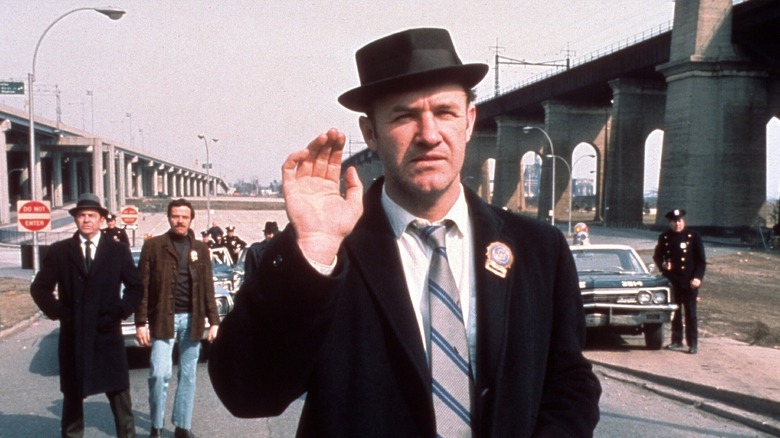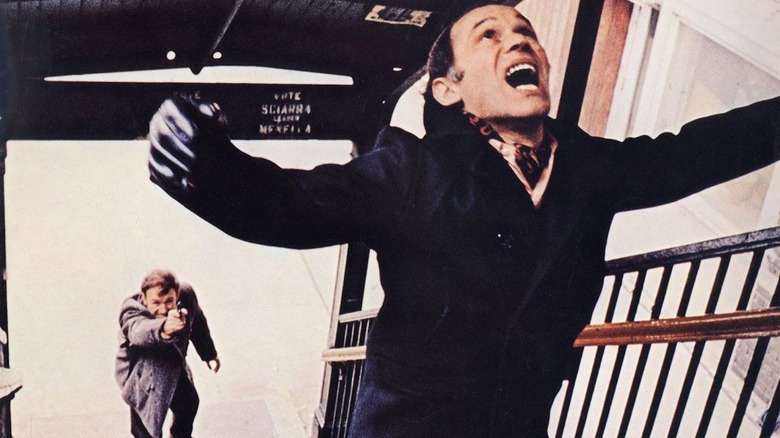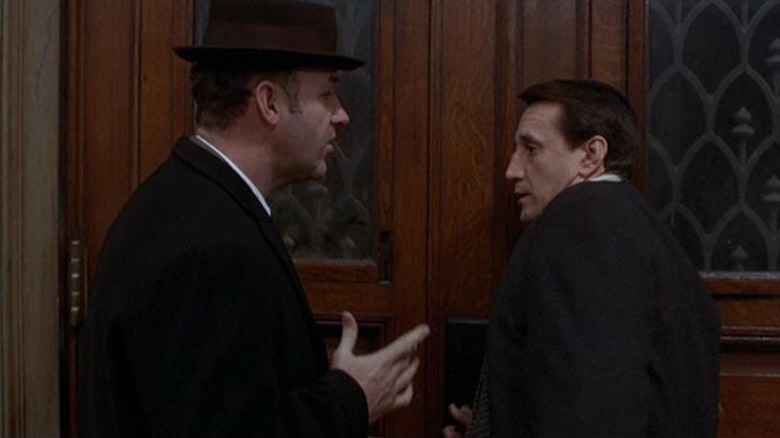The Fox Thriller That Became The First R-Rated Film To Win Best Picture
The New Hollywood revolution was raging in 1971, and studios were rapidly transitioning from old-school leadership to boat-rocking up-and-comers who seemed to have the pulse of the Baby Boomer-driven counterculture. The age of star-studded mega-musicals and old-fashioned oaters was over; movies didn't necessarily need a serrated edge to slash into the zeitgeist, but even a weepie like Arthur Hiller's "Love Story" boasted a lived-in verisimilitude. These films, shorn of backlot artifice, were happening in the real world.
Young moviegoers weren't the only ones craving authenticity. John Schlesinger's "Midnight Cowboy" couldn't have been voted Best Picture of 1969 without significant support from gray-haired Academy of Motion Picture Arts and Sciences members (even though their overwhelming majority likely split their vote between the more conventionally pleasing "Hello, Dolly!" and "Anne of a Thousand Days"). This was a film that plunged viewers into the seamiest iteration of New York City ever captured by a studio movie, that dealt with issues of sex work and homosexuality so unflinchingly that the MPAA (now known as MPA) gave it an X-rating.
Given that the classification was phased out in 1990 in favor of the ostensibly less stigmatizing NC-17, "Midnight Cowboy" will forever be the only X-rated film to win Best Picture. Schlesinger's movie has since been downgraded to an R, so you could say that it was, in a sense, the first picture worthy of that restrictive rating to win the Academy's top award as well. But if you prefer to be historically accurate (and this is an essential preference), it would take a couple of years for an officially R-rated film to take home the Best Picture trophy — and that film is as exhilarating and problematic as it was a half-century ago.
The Pardon-My-French Connection
William Friedkin was an inveterate s**t-stirrer. Whatever you think of his 1970 adaptation of Mart Crowley's play "The Boys in the Band," it was a landmark work of gay cinema that most career-savvy directors of the era would have avoided. Friedkin wanted to get in the audience's face. He wanted to rattle them. But, above all, he wanted to deliver an exhilarating celluloid experience.
Based on the real-life exploits of New York City detective Eddie Egan, Friedkin also crafted a full-throttle portrait of police work as street-level warfare. Sound familiar? Probably every awful cop of a certain era that ever donned the shield viewed Gene Hackman's Jimmy "Popeye" Doyle as a ruthless-means-to-an-end hero. Narcotics are the scourge of the city. They must be eradicated. Ditto the lowlifes who push them.
"The French Connection" raises these stakes by offering Doyle the opportunity to take down a well-heeled Gallic supplier of heroin. His days of busting up African-American bars in the Bronx in the hopes of catching someone slipping might at last pay off in one big bust of one seriously massive score.
Regardless of what he said about the film's intent in the years prior to his death in 2023 (and he said so very much), Friedkin does not celebrate Doyle. We're attracted to Doyle because Hackman can be a magnetic a-hole, but he's an avowed racist (whether or not you watch the original theatrical cut with his use of the n-word) who flouts due process. We want him to take down Charnier (Fernando Rey) if only to justify this extrajudicial mayhem. Charnier is a bigger threat to the community than the NYPD, right? Right?
"The French Connection" is a rough film, but it's not particularly bloody. There's one brief, hardly scandalous shot of a woman's derriere. So why the R-rating? That's because Friedkin scored another Oscar-history first.
Talk dirty to me, Gene
It is widely accepted that Robert Altman's 1970 antiwar masterpiece, "M*A*S*H," was the first studio movie to deploy ye olde f-bomb. This would make it the first movie ever nominated for Best Picture to use the naughtiest of naughty words. As for the first to win, this was Friedkin's profane triumph.
Movies were finally depicting the way many adults talked in real life, so how could Friedkin make a hard-nosed cop procedural without his characters tossing around the magic word? He couldn't, and, so, the MPAA hit him with the R for Doyle's exasperated utterance of "What is this, a f***in' hospital here?" (He's confiscating drugs from bar patrons at the time.)
The world sounded like this more than most people wanted to admit. J.D. Salinger dropped the f-bomb in "The Catcher in the Rye," and it featured prominently in many of the best novels of the 1960s. Country Joe and the Fish famously led a "F*** You" cheer at Woodstock. The future was here, and it had a potty mouth. If anything, the movies were slow to catch up.
Since "The French Connection," there have been 31 R-rated Best Picture winners. One of those is "The King Speech," which is a reminder that the now-monikered MPA is still ludicrously conservative when it comes to classifying movies for the general public.


